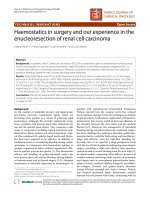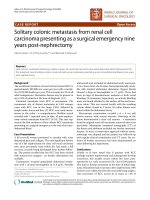Metastatic polyp of the gallbladder from renal cell carcinoma
Bạn đang xem bản rút gọn của tài liệu. Xem và tải ngay bản đầy đủ của tài liệu tại đây (1.35 MB, 7 trang )
Shyr et al. BMC Cancer (2017) 17:244
DOI 10.1186/s12885-017-3243-3
RESEARCH ARTICLE
Open Access
Metastatic polyp of the gallbladder from
renal cell carcinoma
Bor-Uei Shyr1, Shih-Chin Chen1, Yi-Ming Shyr1, Rheun-Chuan Lee2 and Shin-E Wang1*
Abstract
Background: Gallbladder metastasis from renal cell carcinoma (RCC) is extremely rare. The purpose of this study is
to clarify the characteristics of metastatic RCC to gallbladder.
Methods: The pooled data for analysis were collected from the case of metastatic RCC to gallbladder encountered
by our institution along with sporadic cases reported in literature from 1991 to 2015.
Results: A total of 50 cases of metastatic RCC to gallbladder were recruited for study. Fifty-seven percentage of the
primary RCC was from the right kidney and 43% from the left. The median interval between diagnoses of primary
and metastatic RCC to gallbladder was 36 months, with the longest duration up to 324 months. Most (70%) were
asymptomatic. The size of metastatic RCC to gallbladder ranged from 0.8 cm to 9 cm, with median of 2.6 cm.
Majority (91%) of the metastatic RCCs presented as a polypoid mass with narrow stalk, and 82% were hypervascular
lesion. The overall 1 year, 3 year and 5 year survival rate was 91.5%, 76.2% and 59.3% respectively, with a median of
26.5 months. Number of the metastatic site, timing of gallbladder metastasis, symptom, tumor size and operation
type of cholecystectomy seemed to have no impact on survival.
Conclusions: Metastatic RCC to the gallbladder should be taken into account for a gallbladder polypoid mass with
narrow hypervascular stalk during the diagnosis and/or follow-up of primary RCC. Gallbladder metastasis from RCC
is not necessarily to be an advanced stage with poor outcome, and cholecystectomy is recommended whenever
possible.
Keywords: Gallbladder, Metastasis, Renal cell carcinoma
Background
Metastasis to the gallbladder has been considered rare,
and reported from a variety of primary sites, it usually
manifests at a late and advanced stage of malignancy
[1–3]. It is estimated that 30% - 40% of patients with
RCC have already had synchronous metastasis at time
of presentation and another 20% - 50% will develop
metachronous metastasis after nephrectomy for the
primary RCC [2, 4–6]. The common sites of RCC
metastasis are lung, bone, liver, brain, adrenal and
contralateral kidney. Gallbladder metastasis from RCC
has been reported sporadic, and considered extremely
rare [7–10]. it is usually detected only at autopsy with
a rate of less than 0.6% [10]. Clinical diagnosis of
gallbladder metastasis is even rarer [3, 11, 12, 5, 7, 8].
Patients with distant metastasis from RCC usually
present a poor prognosis, with a 5-year survival rate of
<10%. Nevertheless, it is well-known that complete resection of metastasis could have long-term survival in
selected patients with pancreas metastasis of RCC [13].
This favorable prognosis might also be the case for
those with gallbladder metastasis [11].
The purposes of this article are to present our clinical
experience with metastatic polyp of the gallbladder from
RCC and to analyze an expanded sample size by adding
cases reported in the literature to our pool of the study
cases. Thus, a statistic attempt is made to clarify the
demographics, clinical presentations, managements and
survival outcomes of this rare tumor.
* Correspondence:
1
Division of General Surgery, Department of Surgery, Taipei Veterans General
Hospital and National Yang Ming University, 10 F 201 Section 2 Shipai Road,
Taipei 112, Taiwan
Full list of author information is available at the end of the article
© The Author(s). 2017 Open Access This article is distributed under the terms of the Creative Commons Attribution 4.0
International License ( which permits unrestricted use, distribution, and
reproduction in any medium, provided you give appropriate credit to the original author(s) and the source, provide a link to
the Creative Commons license, and indicate if changes were made. The Creative Commons Public Domain Dedication waiver
( applies to the data made available in this article, unless otherwise stated.
Shyr et al. BMC Cancer (2017) 17:244
Methods
Brief description was made for the case of metastatic
polyp of the gallbladder from RCC encountered at our
institution. The study has been approved by the Institutional Review Board of Taipei Veterans General Hospital
(IRB-TPEVGH No.: 2017-03-006BAC). Appropriate written informed consent to participate was obtained from the
patients. Data and materials described in the manuscript,
including all relevant raw data, will be freely available to
any scientist wishing to use them for non-commercial
purposes, without breaching participant confidentiality.
To clarify the characteristics of metastatic RCC to gallbladder, individualized data of these cases described in the
English literature were extracted and added to our database to expand the study sample size for a more complete
analysis. Two methods were utilized to search for relevant
cases in the literature. First, to identify the relevant articles
dealing with metastatic RCC to gallbladder in the English
literature, a computerized search was performed on the
PubMed electronic database, covering data from 1991 to
2015. The following keywords were used for the PubMed
search: metastatic renal cell carcinoma and gallbladder,
gallbladder metastasis and renal cell carcinoma, renal
cell carcinoma metastasis and gallbladder. Second, the
reference lists of PubMed-selected metastatic RCC to
gallbladder articles were screened systematically for
additional studies of interest. A total of 35 related articles were selected for study [1–5, 7–9, 11, 12, 14–38].
Cases without individualized data and duplicate cases
reported in literature were excluded from the analysis.
The data pool from the related literature cases and our
Page 2 of 7
patient were analyzed to determine the characteristics of
metastatic RCC to gallbladder including demographics,
primary renal cell carcinoma, clinical presentations of
RCC metastasis to gallbladder, timing of metastasis, concomitant metastasis to other site, and survival outcomes
whenever possible.
Statistical analyses were performed using Statistical
Product and Service Solutions (SPSS) version 21.0 software (SPSS Inc., IBM, Armonk, NY, USA). All continuous
data were presented as median (range) and mean ± standard deviation (SD), and case number (%) were presented
when appropriate to the type of data. Actuarial survival
was estimated via the Kaplan–Meier method, and a log
rank test was used to determine differences in the
subgroups. For all analyses, a P value less than 0.050 was
considered statistically significant.
Results
A total of 50 cases of metastatic RCC to the gallbladder
were collected for study, including 49 cases from the literature and 1 from our institution. Our case, an 80-yearold man, was diagnosed with a gallbladder tumor during
a postoperative surveillance follow-up by sonography
which showed a big hypoechoic 3.6 × 3.7 cm mass (Fig. 1a)
with a hypervascular stalk (Fig. 1b) to gallbladder fundus in
November 2011. The patient had a history of radical
nephrectomy for right RCC with stage of pT1aN0M0 in
November 1997. Magnetic resonance imaging (MRI) revealed a 4.2 × 3.4 cm pedunculated polypoid lesion arising
from gallbladder fundus. The polypoid gallbladder tumor
demonstrated intermediate signal intensity on T1-weighted
Fig. 1 The gray-scale (a) and color Doppler sonography (b) show arterial flow (white arrow) within the polypoid mass from the cystic artery. On
the T1-weighted fat-saturated spoiled gradient recalled echo (c) and fat-saturated T2 fast spin-echo MRI images (d), the polypoid gallbladder
tumor demonstrates intermediate signal intensity on T1-weighted image and slightly high on T2-weighted image to that of liver parenchyma
Shyr et al. BMC Cancer (2017) 17:244
image (Fig. 1c), slightly high on T2-weighted image
(Fig. 1d), and high intensity on diffusion-weighted image.
Serum tumor markers including alpha-fetoprotein (AFP),
carbohydrate antigen 19-9 (CA 19-9) and carcinoembryonic antigen (CEA) were all within normal limit. The patient underwent an open cholecystectomy under the
impression of gallbladder polyp with malignant change in
March 2012. The resected specimen showed a big wellcircumscribed polypoid mass with a narrow stalk (Fig. 2)
attached to the gallbladder fundus, and the turned out to
be a metastatic RCC by pathologic examination. The
patient recovered uneventfully and remained disease-free
without further adjuvant therapy for 3.5 years.
Analysis of the pooled data (Table 1) indicated that
63% patients were male and 37% were female. The
metastatic RCC to the gallbladder occurred at a median
age of 62 years, ranging from 39 to 80 years. Fifty-seven
percentage of the primary RCC was from the right kidney and 43% from the left. Size of primary RCC ranged
from 0.4 cm to 12.2 cm with a median of 7.8 cm. Majority (75%) of RCC metastasis to the gallbladder were
metachronous. The median interval between diagnoses
of primary and metastatic RCC to gallbladder for the
metachronous metastasis was 60 months, with the
longest duration up to 324 months. Most (70%) were
asymptomatic, while epigastric pain was the most common presentation 23% in symptomatic patients. The
polypoid mass in gallbladder was found by sonography
in 93%, by computed tomography (CT) in 80%, and by
magnetic resonance imaging (MRI) in 21%.
Table 2 described the diagnosis and characteristics of
gallbladder metastasis from RCC. Preoperative diagnosis
suspected metastatic RCC to gallbladder in 44%, gallbladder
polyp in 27% and gallbladder cancer in 17%. The size of
metastatic RCC to gallbladder ranged from 0.8 cm to 9 cm,
with median of 2.6 cm. Majority (91%) of the metastatic
RCCs presented as a polypoid mass with narrow stalk, and
Page 3 of 7
Table 1 Demographics and clinical presentations of gallbladder
metastasis from RCC
Sex, n = 40
Male
25 (63%)
Female
15 (37%)
Age, y/o, n = 39
Median (range)
62 (39 – 80)
Mean’s
61 ± 12
Laterality of primary RCC, n = 42
Right
24 (57%)
Left
18 (43%)
Size of primary RCC, cm, n = 20
Median (range)
7.8 (0.4 – 12.2)
Mean ± SD
7.2 ± 3.3
Timing of gallbladder metastasis, n = 48
Synchromous
12 (25%)
Metachronous
36 (75%)
Interval of metachronous metastasis, month, n = 33
Median (range)
60 (1 – 324)
Mean ± SD
79.4 ± 58.2
Symptoms, n = 43
No
30 (70%)
Epigastric pain
10 (23%)
Nausea or vomiting
4 (9%)
Epigastric fullness
3 (7%)
Body weight loss
2 (5%)
Jaundice
1 (2%)
Duration of symptom, month, n = 37
Median (range)
0 (0 – 6)
Mean ± SD
0.3 ± 1.0
Diagnosis method
Sonography, n = 42
39 (92.9%)
CT scan, n = 44
35 (79.5%)
MRI, n = 39
8 (20.5%)
RCC renal cell carcinoma, SD standard deviation, MRI magnetic resonance
imaging, CT computed tomography
Fig. 2 The metastatic renal cell carcinoma presents a wellcircumscribed polypoid mass with a narrow stalk (white arrow)
to the fundus of gallbladder
82% were hypervascular lesion by image studies. The metastatic RCC was located on gallbladder fundus in 48%, body
in 41% and neck in 12%. Most (72%) of the metastatic
RCCs to the gallbladder were not associated with gallstone.
Multiple metastasis occurred in 28% at the diagnosis of
metastatic RCC to gallbladder, and the most common
concomitant additional site of RCC metastasis was contralateral kidney and lung (12.8%), followed by bone (6.4%).
Eighty-seven percentage of patients were treated with
cholecystectomy by open laparotomy, 13% by laparoscopic approach, and 25% received additional adjuvant
therapy. Two-thirds of patients had no recurrence. The
Shyr et al. BMC Cancer (2017) 17:244
Page 4 of 7
Table 2 Diagnosis and characteristics of gallbladder metastasis
from RCC
Preoperative diagnosis, n = 41
Gallbladder metastasis from RCC
18 (44%)
Gallbladder polyp
11 (27%)
Gallbladder cancer
7 (17%)
Acute cholecystitis
3 (7%)
Gallstone
2 (5%)
Size of metastatic RCC to gallbladder, cm, n = 40
Median (range)
2.6 (0.8 – 9)
Mean ± SD
2.9 ± 1.8
Vascularity of metastatic RCC to gallbladder, n = 27
Hypervascular
22 (82%)
Heterogenous
5 (18%)
Location of metastatic RCC in gallbladder, n = 42
Fundus
20 (48%)
Body
17 (40%)
Neck
5 (12%)
Appearance of metastatic RCC in gallbladder, n = 42
Polypoid mass with narrow stalk to gallbladder
38 (91%)
Polypoid mass with wide base to gallbladder
4 (9%)
Presence of gallbladder stone, n = 39
No
28 (72%)
Yes
11 (28%)
Concomitant multiple metastasis, n = 47
13 (28%)
Contralateral kidney
6 (13%)
Lung
6 (13%)
Bone
3 (6%)
Adrenal
2 (4%)
Pancreas
1 (2%)
RCC renal cell carcinoma, SD standard deviation
overall 1 year, 3 year and 5 year survival was 91.5%,
76.2% and 59.3% respectively, with a median of
26.5 months (1–132 months) (Table 3). Number of the
metastatic site, timing of metastasis gallstone, symptom, tumor size and operation type of cholecystectomy
seemed to have no survival impact.
Discussion
Metastatic gallbladder tumors are not common, about
4.8% of all gallbladder malignancies [39]. melanoma,
stomach cancer, RCCs, hepatocellular carcinoma, colorectal cancer, breast cancer, and lung cancers have been
reported to be the common cancers that could
metastasize to the gallbladder [3, 4, 39]. RCC, accounting for 3% of all malignancies in adults and 85% of
primary renal tumors, has a great propensity to develop
synchronous or metachronous metastasis to various
anatomic sites [1, 40]. Moreover, late and solitary metastasis have been a unique clinical presentation for RCC
after nephrectromy [13].
This study found gallbladder metastasis from RCC
occurred with male predominance (63%), and at a median age of 62 years. Although the gallbladder is in right
abdomen, primary RCC could be from either the right
(57%) or left kidney (43%). Most (75%) of gallbladder
metastases from RCC were metachronous. The median
time to gallbladder metastasis following nephrectomy in
metachronous cohort was 5 years, with longest one up
to 27 years. Majority (72%) were solitary gallbladder
metastasis without other site metastasis at the time of
diagnosis. The unique clinical entity of solitary and late
metachronous metastasis seems to be observed not only
in other organs such as pancreas [13] but also in gallbladder. Although the median tumor size was 2.6 cm,
most (70%) of the patients remained asymptomatic at
the time of diagnosis and/or follow-up of primary RCC.
The low association (28%) of gallstone might explain the
silent clinical presentation.
Although gallbladder polyp (27%), gallbladder cancer
(17%) and acute cholecystitis (7%) were considered in
some patients preoperatively, metastatic RCC to the gallbladder was nevertheless on the priority diagnosis in
44% cases with the history of primary RCC. In this
study, we found most (91%) of the metastatic RCCs presented as a polypoid mass with narrow stalk, and 82%
were hypervascular lesion by image studies. It has been
observed that metastatic adenocarcinoma of the GB
manifested as infiltrative and persistently enhancing wall
thickenings, while the metastatic non-adenocarcinoma
such as RCC usually manifested as a polypoid lesion in
the gallbladder by computed tomography (CT) imaging
study [3, 4, 14]. Some imaging studies with ultrasound,
CT scan or MRI also showed a hypervascular polypoid
mass like that of our case [4, 14]. The metastatic polypoid
mass showed high intensity on diffusion-weighted images,
and the apparent diffusion coefficient was relatively low
on MRI. These imaging findings are considered characteristic and may be helpful for preoperative diagnosis [4, 14].
Therefore, metastatic RCC should be taken into account
for a gallbladder polyp with narrow hypervascular stalk,
especially for those with the history of RCC.
Gallbladder metastasis from RCC is not necessarily to
be an advanced stage with poor outcome, especially for
those with late and solitary metastasis [4, 7, 12, 13]. Based
on the experience in the more typical metastatic sites such
as pancreas, lung bone, resectability, long time to recurrence, good performance status and oligometastatic disease have better benefit of metastasectomy [10, 13, 41].
Cholecystectomy should be considered because only such
management could provide an opportunity for longer
survival [16, 25–27, 34]. This study revealed the median
Shyr et al. BMC Cancer (2017) 17:244
Page 5 of 7
Table 3 Survival outcomes of gallbladder metastasis from RCC
Median (range)
Mean ± SD, month
Overall, n = 26
26.5 (1 – 132)
1 year
survival
91.5%
3 year
survival
76.2%
5 year
survival
P value
59.3%
35.3 ± 31.4
Gallbladder metastasis
Solitary, n = 15
0.333
27 (6 – 96)
93.3%
80.0%
80.0%
87.5%
70.0%
23.3%
92.3%
76.9%
46.2%
66.7%
66.7%
40.6 ± 26.4
Combined with other site
metastasis, n = 11
12 (1 – 132)
28.1 ± 37.4
Gall stone
Without, n = 15
0.831
24 (1 – 96)
30.4 ± 25.9
With, n = 6
26 (6 – 47)
100%
25.5 ± 15.1
Symptom
Without, n = 19
0.317
26 (1 – 132)
94.4%
84.0%
60.0%
75.0%
50.0%
50.0%
85.7%
85.7%
85.7%
93.3%
70.0%
46.7%
36.9 ± 32.0
With, n = 6
18.5 (3 – 96)
31.5 ± 36.0
Timing of metastasis
0.325
Synchronous, n = 8
25 (1 – 132)
Metachronous, n = 17
27 (3 – 96)
38 ± 42.1
33.4 ± 27.4
Tumor size
≤ 2 cm, n = 9
0.607
37 (6 – 132)
88.9%
74.1%
44.4%
92.3%
76.9%
76.9%
90.5%
74.0%
55.5%
42.4 ± 37.7
> 2 cm, n = 16
24 (1 – 96)
31.9 ± 29.0
Cholecystectomy
Open, n = 23
0.398
27 (1 – 132)
37.1 ± 32.4
Laparoscopic, n = 3
12 (6 – 47)
100%
100%
100%
21.7 ± 22.1
survival time was 26.5 months, with 91.5% 1-year and
59.3% 5-year survival. A multivariate analysis showed that
favorable predictors of survival for metastatic RCC included single site of first recurrence, curative resection of
first metastasis, long disease-free interval, solitary site of
first metastasis, and metachronous metastasis [42]. It is
also shown that the longer interval between diagnosis of
RCC and gallbladder metastasis the better the survival
[15]. In this study, number of the metastatic site, timing of
metastasis gallstone, symptom, tumor size and operation
type of cholecystectomy seemed to have no survival
impact. However, it is hard to draw a solid conclusion
from this retrospective study with a small sample size.
Conclusions
Gallbladder metastasis from RCC is a rare but unique
clinical entity. Metastatic RCC should be taken into
account for a gallbladder polypoid mass with narrow
hypervascular stalk at the diagnosis and/or follow-up of
primary RCC. Gallbladder metastasis from RCC is not
necessarily to be an advanced stage with poor outcome,
especially for those with late and solitary metastasis.
Shyr et al. BMC Cancer (2017) 17:244
Cholecystectomy should be considered to determine the
definitive diagnosis and provide better survival outcome
whenever possible.
Abbreviations
AFP: Alpha-fetoprotein; CA 19-9: Carbohydrate antigen 19-9;
CEA: Carcinoembryonic antigen; CT: Computed tomography; MRI: Magnetic
resonance imaging; RCC: Renal cell carcinoma
Acknowledgements
Not applicable.
Funding
Not applicable.
Availability of data and materials
Data and materials described in the manuscript, including all relevant raw
data, will be freely available to any scientist wishing to use them for noncommercial purposes, without breaching participant confidentiality.
Authors’ contributions
SBU and SYM equally contributed to this paper. SBU and SYM made
substantial contributions to conception and design, acquisition of data,
and analysis and interpretation of data. CSC was involved in drafting the
manuscript or revising it critically for important intellectual content. LRC
was involved in drafting the manuscript or revising it critically for important
intellectual content and agreed to be accountable for all aspects of the
imaging studies in ensuring that questions related to the accuracy. WSE
made substantial contributions to conception and design, acquisition of
data, and analysis and interpretation of data and gave final approval of the
version to be published. All authors read and approved the final manuscript.
Competing interests
The authors declare that they have no competing interests.
Consent for publication
Not applicable.
Page 6 of 7
6.
7.
8.
9.
10.
11.
12.
13.
14.
15.
16.
17.
18.
Ethics approval and consent to participate
The study has been approved by the Institutional Review Board of Taipei Veterans
General Hospital (IRB-TPEVGH No.: IRB-TPEVGH No.: 2017-03-006BAC). Appropriate
written informed consent to participate was obtained from the patients.
19.
Publisher’s Note
20.
Springer Nature remains neutral with regard to jurisdictional claims in
published maps and institutional affiliations.
21.
Author details
1
Division of General Surgery, Department of Surgery, Taipei Veterans General
Hospital and National Yang Ming University, 10 F 201 Section 2 Shipai Road,
Taipei 112, Taiwan. 2Departments of Radiology, Taipei Veterans General
Hospital, National Yang Ming University, Taipei, Taiwan.
22.
23.
Received: 31 October 2016 Accepted: 29 March 2017
24.
References
1. Ghaouti M, Znati K, Jahid A, Zouaidia F, Bernoussi Z, El Fakir Y, Mahassini N.
A gallbladder tumor revealing metastatic clear cell renal carcinoma: report
of case and review of literature. Diagn Pathol. 2013;8:4.
2. Turner G, Flint R. Metastatic renal cell carcinoma–an unexpected finding
after laparoscopic cholecystectomy. N Z Med J. 2014;127(1402):110–2.
3. Choi WS, Kim SH, Lee ES, Lee KB, Yoon WJ, Shin CI, Han JK. CT findings of
gallbladder metastases: emphasis on differences according to primary
tumors. Korean J Radiol. 2014;15(3):334–45.
4. Chung PH, Srinivasan R, Linehan WM, Pinto PA, Bratslavsky G. Renal cell
carcinoma with metastases to the gallbladder: four cases from the National
Cancer Institute (NCI) and review of the literature. Urol Oncol. 2012;30(4):476–81.
5. Win AZ. Renal cell carcinoma metastasis to the gallbladder detected by
FDG-PET/CT. J Clin Med Res. 2014;6(6):482–6.
25.
26.
27.
28.
29.
Press GA, McClennan BL, Melson GL, Weyman PJ, Mauro MA, Lee JK.
Papillary renal cell carcinoma: CT and sonographic evaluation. AJR Am J
Roentgenol. 1984;143(5):1005–9.
Fang X, Gupta N, Shen SS, Tamboli P, Charnsangavej C, Rashid A, Wang H.
Intraluminal polypoid metastasis of renal cell carcinoma in gallbladder
mimicking gallbladder polyp. Arch Pathol Lab Med. 2010;134(7):1003–9.
Patel S, Zebian B, Gurjar S, Pavithran N, Singh K, Liston T, Grant J. An
unusual gall-bladder polyp–site of metastatic renal cell carcinoma: a case
report. Cases J. 2009;2:172.
Kawahara T, Ohshiro H, Sekiguchi Z, Furuya M, Namura K, Itoh H, Sano F,
Kawaji K, Hayashi N, Makiyama K, et al. Gallbladder metastasis from renal cell
carcinoma. Case Rep Oncol. 2010;3(1):30–4.
Weiss L, Harlos JP, Torhorst J, Gunthard B, Hartveit F, Svendsen E, Huang
WL, Grundmann E, Eder M, Zwicknagl M, et al. Metastatic patterns of renal
carcinoma: an analysis of 687 necropsies. J Cancer Res Clin Oncol. 1988;
114(6):605–12.
Shoji S, Mukai M, Yazawa N, Sekido Y, Nagata Y, Uchida T, Terachi T.
Metastasis to gallbladder and adrenal gland of renal cell carcinoma. Oncol
Lett. 2010;1(3):507–9.
Zevallos Quiroz JC, Lizarazu Perez A, Guisasola Gorrochategui E, Medrano
Gomez MA, Jimenez Aguero R. Gallbladder metastasis from renal cell
carcinoma, an extremely rare neoplastic dissemination location. Cirugia
Espanola. 2014;92(4):295–6.
Hung JH, Wang SE, Shyr YM, Su CH, Chen TH, Wu CW. Resection for
secondary malignancy of the pancreas. Pancreas. 2012;41(1):121–9.
Ueda I, Aoki T, Oki H, Takahashi H, Hayashida Y, Minagawa N, Yamaguchi K,
Fujimoto N, Matsumoto T, Yamada S, et al. Gallbladder metastasis from
renal cell carcinoma: a case report with review of the literature. Magn Reson
Med Sci. 2015;14(2):133–8.
Jain D, Chopra P. Metastatic renal cell carcinoma of gall bladder. Saudi J
Kidney Dis Transpl. 2013;24(1):100–4.
Zygulska AL, Wojcik A, Richter P, Krzesiwo K. Renal carcinoma metachronous
metastases to the gall-bladder and pancreas–case report. Pol Przegl Chir.
2012;84(6):313–6.
Robledo AB, Millet SB, Orbis Castellanos JF, Montalva Oron EM, Salom Fuster
JV, DE Juan Burgueño M. Metastasis of the gallbladder in clear cell renal
carcinoma. Oncol Lett. 2012;3(5):1136–8.
Collin Y, Sabbagh R. An unusual case of pancreatitis revealing a
metachronous renal cell carcinoma metastasis to the gallbladder. Can J
Urol. 2012;19(4):6392–4.
Decoene J, Ameye F, Lerut E, Oyen R, Van Poppel H, Joniau S. Renal cell
carcinoma with synchronous metastasis to the calcaneus and
metachronous metastases to the ovary and gallbladder. Case Rep Med.
2011;2011:671645.
Sand M, Bechara FG, Kopp J, Krins N, Behringer D, Mann B. Gallbladder
metastasis from renal cell carcinoma mimicking acute cholecystitis. Eur J
Med Res. 2009;14:90–2.
Kucukakin B, Olsen CH, Gogenur I. Renal cell carcinoma with metachronous
metastases to the gallbladder after two years. Ugeskr Laeger. 2009;171(35):2486–7.
Nojima H, Cho A, Yamamoto H, Nagata M, Takiguchi N, Kainuma O, Souda H,
Gunji H, Miyazaki A, Ikeda A, et al. Renal cell carcinoma with unusual metastasis
to the gallbladder. J Hepato-Biliary-Pancreat Surg. 2008;15(2):209–12.
Hellenthal NJ, Stewart GS, Cambio AJ, Delair SM. Renal cell carcinoma
metastatic to gallbladder: a survival advantage to simultaneous
nephrectomy and cholecystectomy. Int Urol Nephrol. 2007;39(2):377–9.
Pandey D, Kane SV, Shukla PJ, Shrikhande SV, Tongaonkar HB. Isolated gall
bladder metastasis from renal cell carcinoma. Indian J Gastroenterol. 2006;
25(3):161–2.
Ishizawa T, Okuda J, Kawanishi T, Kitagawa T, Yakumaru K, Sekikawa T. Metastatic
renal cell carcinoma of the gallbladder. Asian J Surg. 2006;29(3):145–8.
Park JS, Chae YS, Hong SJ, Shin DH, Choi JS, Kim BR. Metastatic renal cell
carcinoma of the gallbladder. Yonsei Med J. 2003;44(2):355–8.
Limani K, Matos C, Hut F, Gelin M, Closset J. Metastatic carcinoma of the
gallbladder after a renal cell carcinoma. Acta Chir Belg. 2003;103(2):233–4.
Aoki T, Inoue K, Tsuchida A, Aoki T, Kasuya K, Kitamura K, Koyanagi Y,
Shimizu T. Gallbladder metastasis of renal cell carcinoma: report of two
cases. Surg Today. 2002;32(1):89–92.
Kechrid M, Malik GH, Al-Mohaya S, Shaikh JF, Al-Wakeel JS, El Gamal H,
Farouk H, Jasser A, Shetia MS. Renal cell carcinoma of contralateral kidney
with secondaries in gallbladder eight years after nephrectomy. Saudi J
Kidney Dis Transpl. 2000;11(4):587–92.
Shyr et al. BMC Cancer (2017) 17:244
Page 7 of 7
30. Celebi I, Guzelsoy M, Yorukoglu K, Kirkali Z. Renal cell carcinoma with
gallbladder metastasis. Int J Urol. 1998;5(3):288–90.
31. Sparwasser C, Krupienski M, Radomsky J, Pust RA. Gallbladder metastasis of
renal cell carcinoma. A case report and review of the literature. Urol Int.
1997;58(4):257–8.
32. Lombardo FP, Hertford DE, Shanahan EM, Kazam E. Color Doppler
ultrasonographic evaluation of renal cell carcinoma metastasis to the
gallbladder. J Ultrasound Med. 1996;15(10):725–8.
33. Pagano S, Ruggeri P, Franzoso F, Brusamolino R. Unusual renal cell
carcinoma metastasis to the gallbladder. Urology. 1995;45(5):867–9.
34. King DH, Centeno AS, Saldivar VA, Sarosdy MF. Renal cell carcinoma
metastatic to the gallbladder or prostate: two case reports. Urology.
1995;46(5):722–5.
35. Coskun F, Cetinkaya M, Cengiz O, Adsan O, Kulacoglu S, Eroglu A. Metastatic
carcinoma of the gallbladder due to renal cell carcinoma in the ectopic
kidney. Acta Chir Belg. 1995;95(1):56–8.
36. Bittinger A, Altekrüger I, Barth P. Clear cell carcinoma of the gallbladder.
Pathol Res Pract. 1995;191(12):1259–65.
37. Nagler J, McSherry CK, Miskovitz P. Asymptomatic metachronous metastatic
renal cell adenocarcinoma to the gallbladder. Report of a case and
guidelines for evaluation of intraluminal polypoid gallbladder masses. Dig
Dis Sci. 1994;39(11):2476–9.
38. Satoh H, Iyama A, Hidaka K, Nakashiro H, Harada S, Hisatsugu T. Metastatic
carcinoma of the gallbladder from renal cancer presenting as intraluminal
polypoid mass. Dig Dis Sci. 1991;36(4):520–3.
39. Yoon WJ, Yoon YB, Kim YJ, Ryu JK, Kim YT. Metastasis to the gallbladder: a
single-center experience of 20 cases in South Korea. World J Gastroenterol.
2009;15(38):4806–9.
40. Choi JB, Yoon BI, Kim SJ, Cho HJ, Hong SH, Choi YJ, Kim SW, Hwang TK, Lee JY.
Changes in clinicopathological characteristics of renal cell carcinoma in the
past 25 years: a single-center experience. Korean J Urol. 2011;52(2):110–4.
41. Dabestani S, Marconi L, Bex A. Metastasis therapies for renal cancer. Curr
Opin Urol. 2016;26(6):566–72.
42. Kavolius JP, Mastorakos DP, Pavlovich C, Russo P, Burt ME, Brady MS.
Resection of metastatic renal cell carcinoma. J Clin Oncol. 1998;16(6):2261–6.
Submit your next manuscript to BioMed Central
and we will help you at every step:
• We accept pre-submission inquiries
• Our selector tool helps you to find the most relevant journal
• We provide round the clock customer support
• Convenient online submission
• Thorough peer review
• Inclusion in PubMed and all major indexing services
• Maximum visibility for your research
Submit your manuscript at
www.biomedcentral.com/submit









